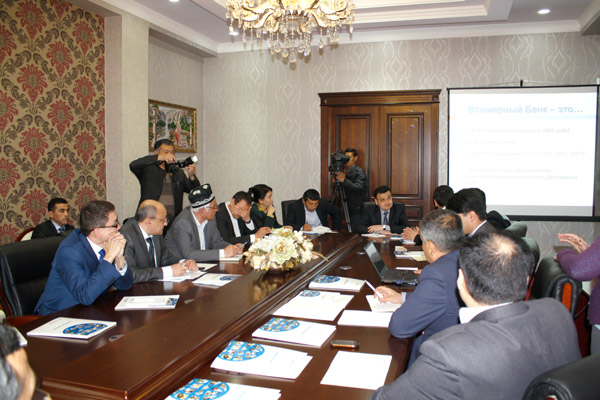Friday, 20/02/2026 | 16:14 GMT+7
Andijan city hosted a seminar “Increasing efficiency of energy resources use at the industrial enterprises” for representatives of mass media.
The seminar was organized by the World Bank Country Office in Uzbekistan and Ministry of Economy of Uzbekistan.
At the event, it was underlined that the Government of Uzbekistan pays great attention to improving energy-efficiency of industrial enterprises.
Since 2012, Uzbekistan and the World Bank have been implementing Energy Efficiency Facility for Industrial Enterprises Project.

Ulugbek Abdullaev, head of the project coordination group at the Ministry of Economy of Uzbekistan, said that the World Bank provided US$25 million to the first phase of the project to Uzbekistan and US$100 million to the second phase.
Uzpromstroybank, Asaka Bank and Hamkorbank are participating in implementation of the project. The project issue loans to finance projects of large industrial enterprises to improve energy-efficiency. At the same time, 80% of issued of loans are financed due to resources of the World Bank and 20% - own resources of the Uzbek banks.
Abdullaev underlined that currently about 79 projects are implemented and at preparation stage. Their total cost is US$166 million, of which US$125 million will be resources of the World Bank. The projects are implemented in mining, chemical, oil and gas, food and other industries.
The project implementation will help to save 550 million KWH of electricity and 150 million cubic meters of gas a year, he said. Abdullaev said that 550 million KWH of electricity will allow to meet annual demand of electricity of 150,000 domestic consumers and 150 million cubic meters – 25,000 domestic consumers.
During the seminar, it was said that improving energy-efficiency will positively production of the enterprises – increase their competitiveness due to decreasing share of expenses to energy resources in prime cost of the project.
Within the seminar, the participants familiarized with projects, implemented in Andijan region. In particular, the reporters visited Andijan Biochemical Plant.
Andijan Biochemical Plant received US$674,000 loan within the World Bank-funded project to purchase equipment for production of food carbonic acid gas.
Head engineer of Andijan Biochemical Plant Zafarbek Hudoyarov said that earlier CO2 gas, emitted during wheat fermentation discarded to atmosphere, now thanks to new equipment, the plant will expand assortment of produced goods, increase efficiency of used resources and profitability of production as a whole.
He said that China’s Zhuhai Gongtong Low Carbon Technology CO.,Ltd won a tender for supply of CO2 recuperation equipment. The capacity of the equipment is 500 kg of purified CO2 an hour. The enterprise will produce 4,830 tonnes of purified CO2.
Hudoyarov added that the project will also allow to cut use of electricity by 1.5 times – from 300 KWH to 160 KWH. At the same time, the plant received opportunity to produce purified CO2, which can be used in food industry. Earlier, the plant produced CO2 of 98.8% purification, now the figure will reach 99.9%.
Hudoyorov said that new capacities on CO2 recuperation will be launched by the end of April 2015.
Another project, implemented at financial assistance of the World Bank, will be implemented in 2016-2018 at small hydro power station (HPS JFK-1) in Bulakbashi district of Andijan region.
HPS JFK-1 will receive US$12.8 million from Uzstroybank. Within the project it is planned to replace main equipment of the station, which will allow to increase electricity production from 7 million KWH to 17 million KWH a year.
Soon, it is planned to announce a tender for modernization of the station and the equipment supplier and final cost of the project will be determined.
The seminar participants also visited one of local homeowners association, where works on improving energy-efficiency of many-storied houses.
It is worth to mention that the Government of Uzbekistan and World Bank are working on a pilot project on improving energy-efficiency of heating system. The project, after approval of World Bank, will be implemented in three cities of Uzbekistan, including in Andijan.
Iskander Buranov, energy specialist of the World Bank, said that heat loss can be decreased due to easy and inexpensive interventions, such as maintenance of tightness doors and hatches in the doorways of houses, installation of new windows, insulation of balconies and seismic joints of the houses.
He noted that it is necessary to adopt measures on heating loss before modernization of heating system. Decreasing heat loss will allow to decrease capacities of new heating systems, which will be purchased due to loan of the World Bank. New and efficient heating system will increase comfort of houses and decrease electricity and gas consumption by consumers in winter time.
Local homeowners associations started to work over this problem. At the assistance of local bank, they are installing new windows, insulation of balconies and modernization of roofs. Allocation of the World Bank loan will speed up this process and modernize central heating system.
Anh Tuan








 Consultation on the methodology for developing and updating energy consumption standards for four major industrial sectors
Consultation on the methodology for developing and updating energy consumption standards for four major industrial sectors
 Opening of the 2025 Energy-Efficient Equipment and Green Transition Exhibition Fair
Opening of the 2025 Energy-Efficient Equipment and Green Transition Exhibition Fair
 Energy-saving solutions and green transition promotion
Energy-saving solutions and green transition promotion
 The 9th VEPG Steering Committee Meeting: Strengthening Coordination for Viet Nam’s Just Energy Transition
The 9th VEPG Steering Committee Meeting: Strengthening Coordination for Viet Nam’s Just Energy Transition